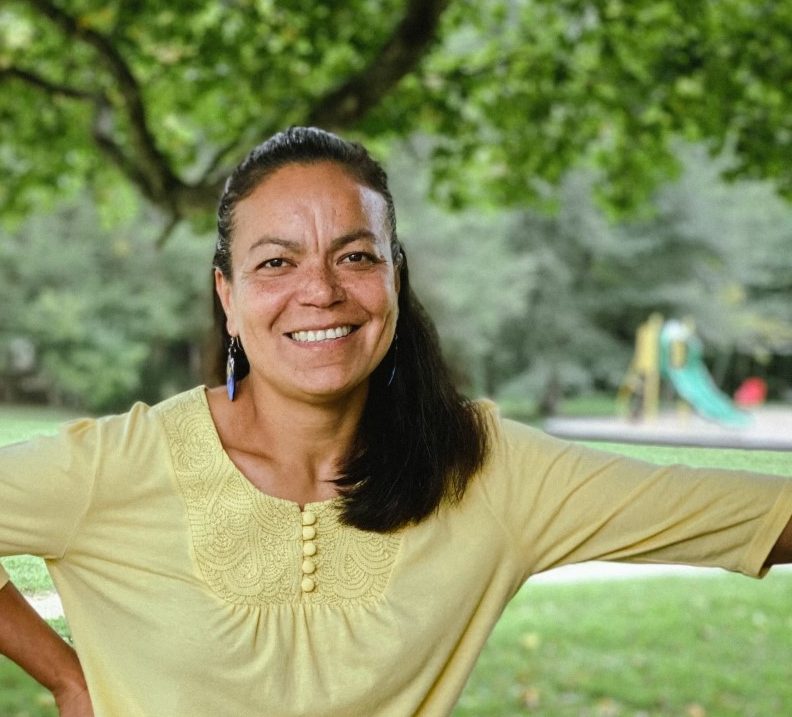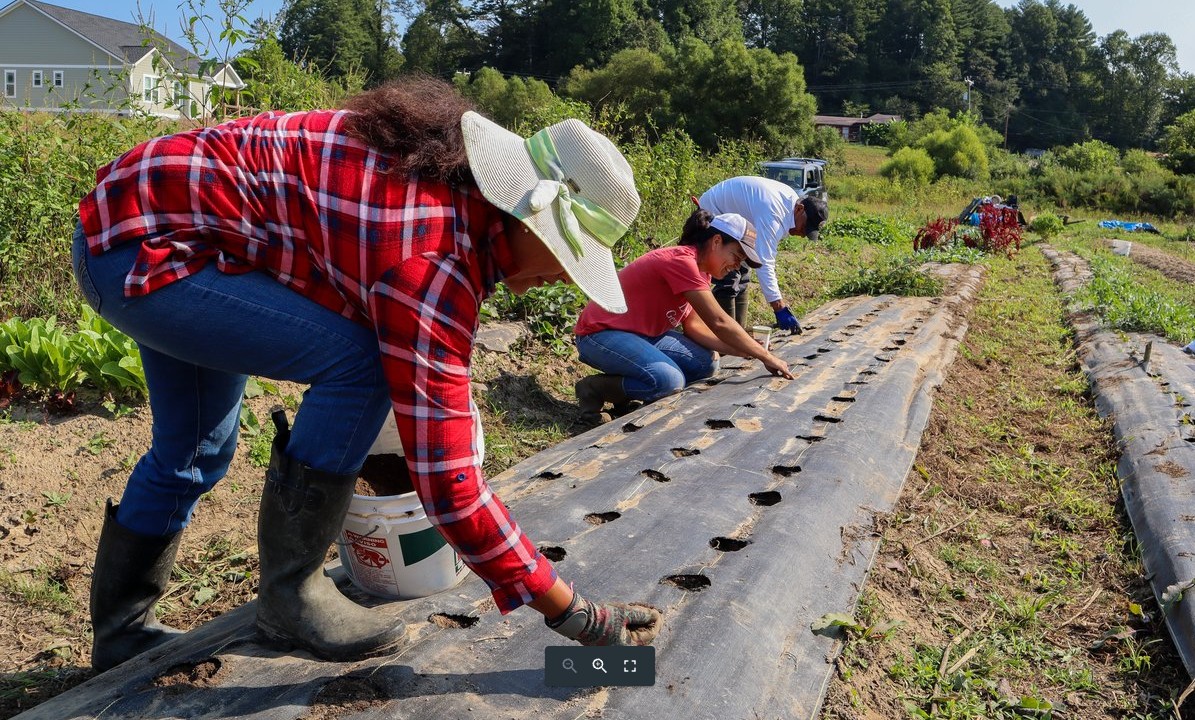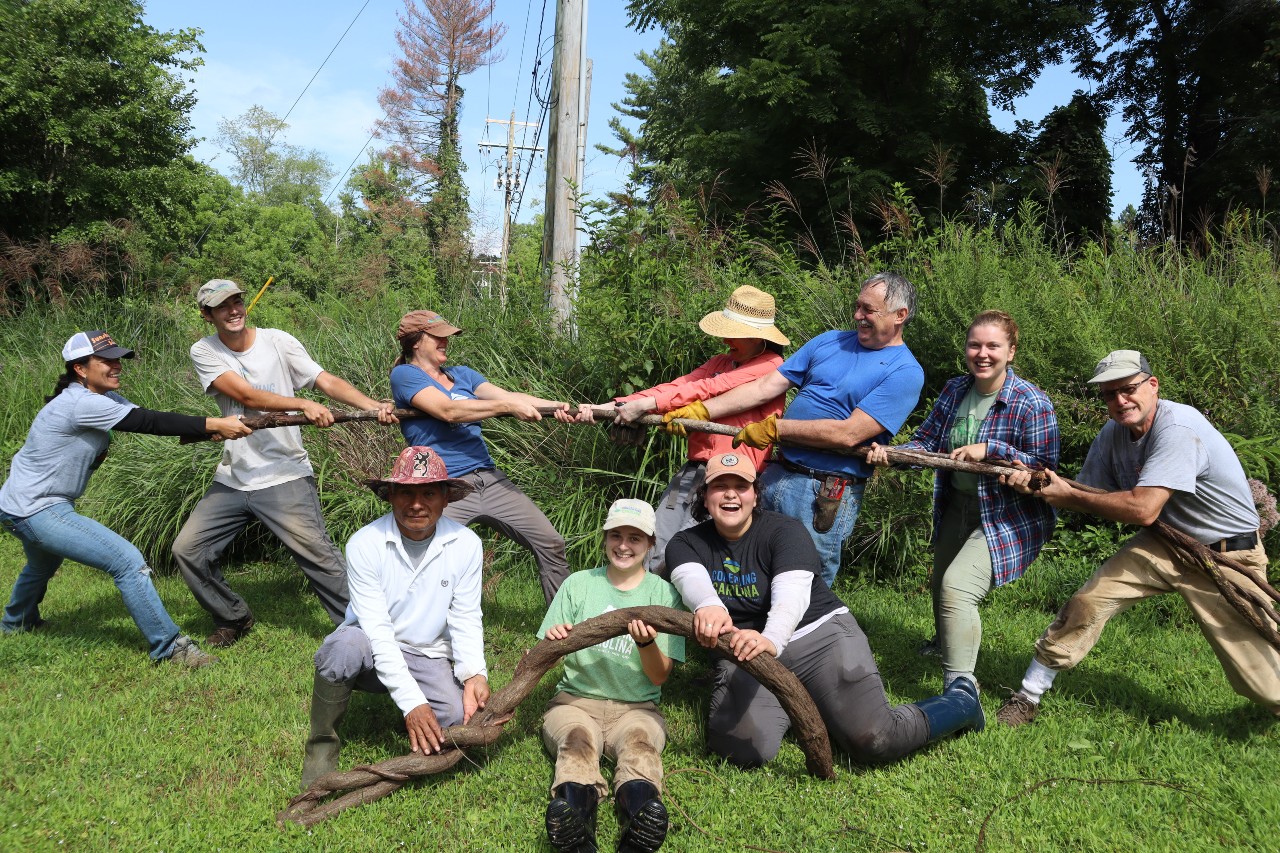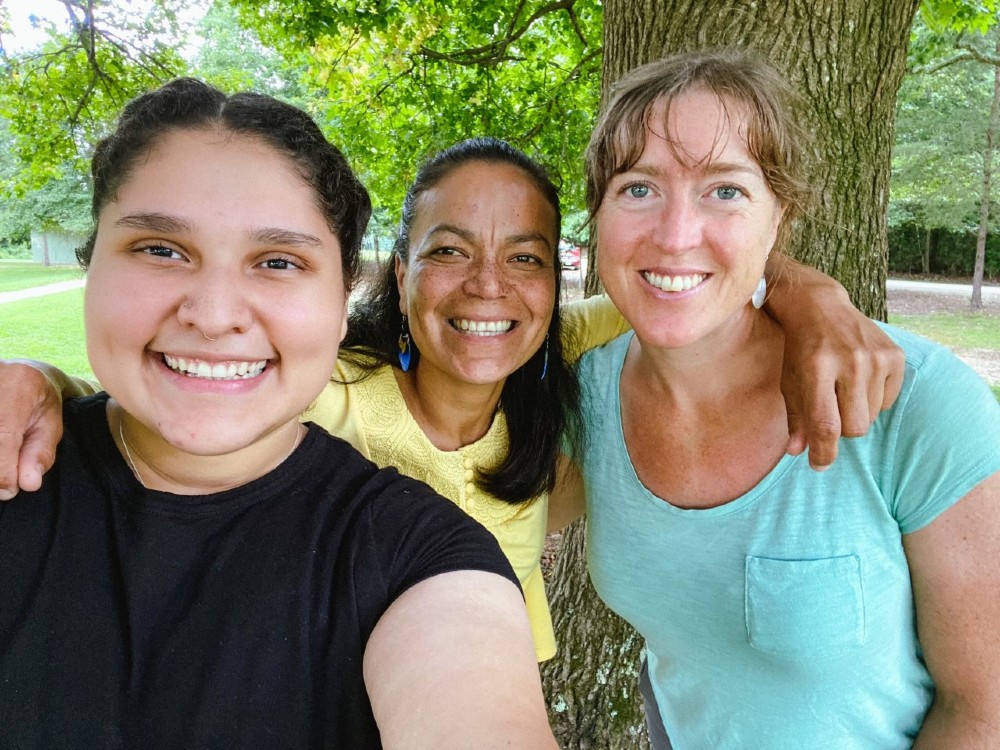Where Can You Feel at Home?
Volunteers are creating an outdoor community space for Latinx community.

Sometimes, as an immigrant, you’re so focused on survival you don’t let yourself relax, ever, says Delia Jovel Dubón. You don’t prioritize your own health. You don’t take the time to laugh with your neighbors, to share food, to enjoy the flowers. You need to be so focused on your goals. You need to be so driven to succeed in this new land. You can improve your life here—but you can also lose everything so quickly.
Still, to Delia, the land itself is welcoming. The lush green mountains bring back her childhood in El Salvador. The land teaches her how to raise vegetables.
That food is a source of nourishment—body and soul—and that nourishment can be shared.
A single mother with a special needs child, Delia provides for her family. She’s also a grower in a farmers’ co-op. She helped start a food bank offering fresh food. And she recently launched a project to transform a tract of land covered in kudzu into a Hispanic community center called Las Flores—”The Flowers.”
At this space between Hendersonville and Mills River, there will be community gardens, a pavilion, a play area.
Delia says of her vision for it, “I see people having a good time together. It’s a place where people can feel safe—because I think the hard part for any immigrant is how you can feel comfortable in a country that is not yours. And I think for many of us, we are never comfortable. It’s like you are always finding the way to feel at home. And it’s not easy because of all the context showing you, you are not from here.”
Hear Delia speak about her vision for Las Flores
Video by Alexla Perez-Sanchez
Unsafe and Uprooted
Delia was born in El Salvador in 1976. Her father was a peasant, she says—a small farmer who drew his living from the land. “I was always so surprised about what is possible to have through the nature—you know, food, air, everything,” Delia says.
But when she was a child, civil war tore her country apart.
“That means sad stories about a country that is always fighting—noise, bombs,” she says. “I think for my generation who lived the civil war, talking about it is like a bad dream. It is weird, but sometimes I laugh when I’m telling stories about that time, not because it’s funny, but because it’s the only way that you have to manage all those feelings and memories.”
The fighting drove her family to live in the city. “It was a safer, for a while,” Delia says. “The war started in the rural area where people organized, and after moved to the city. It’s a very small country and finally you were not really safe anywhere.”
In 2014, the war was behind her, but Delia faced a new crisis. She was expecting a baby when she came to visit her family in Henderson County. She wasn’t planning to stay in the U.S. but while she was here, she had complications with her pregnancy. Her child was diagnosed with spina bifida, in which the spinal cord doesn’t develop properly. Some children with spina bifida never walk.
“That changed my story,” Delia says. “I had to decide—my life, my future, or my daughter. And I decided for her to stay, and it was the best decision. Countries like us, we don’t have a health system that can protect and support a child with special needs.”
Today her daughter is six years old. Despite her condition, she walks and she is full of energy.
As Delia works to care for her daughter, she also supports her community. In 2020, she co-founded Tierra Fertil Coop, a Hispanic, worker-owned farm. She started a food bank called ABUNDANCIA that gives away fresh food. And she is also working to create a space for Hispanic community members to come together at Las Flores.
“I think the only way that I can survive is by doing this work,” she says. “I try to build a sense of home and community. Being able to support other community members with so much potential makes me feel happy. I learned that when you change others’ realities, you change your own. That is what gives me a lot of thanks for my life.”

Nourished by the Land
El Salvador was not only ravaged by civil war; it also lost most of its tropical rainforest to logging—a loss that Delia says keeps the people in poverty. “How can you have wealth when you do not have natural resources? You cannot.”
For her, arriving in North Carolina was in some ways like a return home.
“I always said I wanted to come back to live in the countryside and finally I arrived to a place that it’s like the small town where I was born. It’s mountains. It’s green everywhere. I feel really blessed and privileged to live in a space that it’s like this.”
Growing food connects her to this land, and to other community members, and it provides some security—knowing that you can provide for yourself and those you love.
While she has had little training in how to farm, she says, “For me, growing food, it’s not hard. Eighty percent of the job is made by nature. When you become very sensitive, you know what you have to do.”
There’s a theory that people can have multiple kinds of intelligence, including naturalistic intelligence—a capacity for skilled observation and interaction with the natural world. She may have that gift, Delia says. “I think I have the feeling for plants.”
But to grow, you need land. Delia and the other growers with Tierra Fértil were looking for a place to farm, when the late William Hamilton of NC Farmlink connected her with Tom Fanslow at Conserving Carolina. Tom suggested they make of use of a 10-acre tract that Conserving Carolina owns near along Highway 191 north of Hendersonville.
This land wasn’t what they needed for the co-op, and Tierra Fértil had already begun farming on an acre that they share with Tiny Bridge Farm. But Delia saw potential in the land, despite the state that it’s in.
Just as these people need land, this land needs people to bring it back to health. The trees are engulfed in kudzu and bittersweet vines that will kill them if left unchecked. Invasive plants like English ivy, Chinese silver grass, and multiflora rose dominate the understory. Before they can begin to create Las Flores, Delia and her partners need to make a space for it.

Volunteering at Las Flores
This summer, volunteers started gathering to remove the invasive plants. They come out one weekend every month (on either a Saturday or Sunday morning) and all are welcome. Volunteers from Conserving Carolina, True Ridge, and Tierra Fértil have been taking on the vines, conversing in English and Spanish.
Greg Miner is a regular Conserving Carolina volunteer who leads the Kudzu Warriors group in Polk County. He’s also been coming out to tackle kudzu at the Las Flores site. He says, “It’s a great project and I’m happy to be a part of it. I think that we can create a social network through this, so we can get to know each other and our different cultures.”

Ericka Berg, Conserving Carolina’s Community Engagement Manager, who is organizing these workdays says, “We are honored to be working with Delia, Tierra Fértil, and True Ridge to bring this vision to life. These workdays bring such joy to my heart and are a wonderful example of community coming together.”
The project needs more financial support and a steady supply of volunteers. But Delia can see Las Flores coming to fruition by 2023.
She says, “What I see there is a beautiful garden with many flowers, different kinds of flowers that also represent the diversity of our community. A space where we can grow food, gather, laugh, talking about different subjects, about funny things. I see a space where people don’t have any issues talking Spanish. It’s a place for celebrations and families. People having hammocks, bringing food, seeing the kids laughing and playing—I see a space where people can feel at home. That is the dream.”
Hear Delia give a poem about nature
This poem, “El Nido” (“The Nest”) was a favorite of Delia’s as a child in El Salvador. She recites the poem in Spanish and there are English subtitles. Video by Alexla Perez-Sanchez.
Author Rose Lane is the communications director of Conserving Carolina, a local land trust that protects, restores, and inspires appreciation of the natural world. To volunteer with the Las Flores project, go to conservingcarolina.org/calendar and look for the next Haywood Knolls Workday. Everyone is invited!
The videos with this story were created by our summer intern, Alexla Perez-Sanchez.
